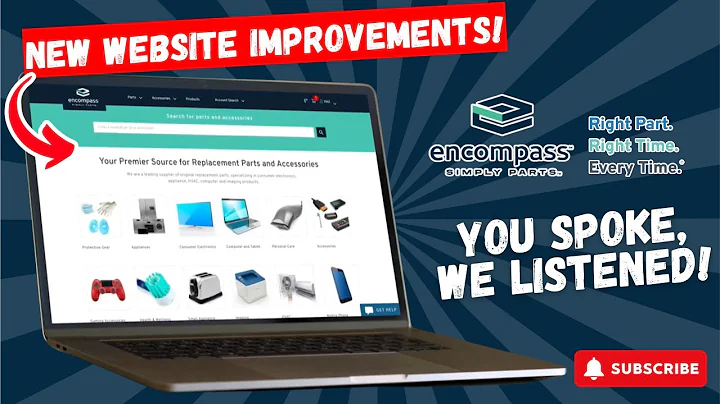Boost Your Shopify Store's Ranking
Table of Contents
- Introduction
- Optimizing the Home Page
- Home Page Title and Description
- Social Sharing Image
- Meta Description
- Collections
- Products
- Pages
- Blog Posts
- Understanding Keywords
- Keyword Research with Google Keyword Planner
- Customizing Search Engine Listings
- Title Optimization
- Description Optimization
- URL Handle Optimization
- Tips for Writing Effective Descriptions
- URL Handle Best Practices
- Importance of SEO for Shopify Stores
- The Long Game of Organic Traffic
- Benefits of Optimizing Your Store
Optimizing Your Shopify Store for Better Search Engine Rankings
In today's digital landscape, the power of Google search cannot be underestimated. Achieving a first-page ranking on Google can significantly increase the visibility and traffic to your online store. But how do you get there? The first step is to ensure that your Shopify store is optimized correctly so that it can be easily discovered by Google's search bots. In this article, we will guide you through the key areas that you need to focus on to improve your search engine rankings.
1. Introduction
Having a well-optimized Shopify store is essential for attracting potential customers. In this article, we will discuss the various elements and strategies that you can employ to enhance your store's visibility on Google search results.
2. Optimizing the Home Page
Your home page is the gateway to your online store, and it plays a crucial role in determining your search engine rankings. There are a few key areas that you need to optimize on your home page.
-
Home Page Title and Description: The title and description of your home page should be carefully crafted to include relevant keywords. This will help Google understand the content of your store and rank it accordingly.
-
Social Sharing Image: When your home page is shared on social media platforms, having an optimized social sharing image can make a significant impact. Ensure that the image reflects your brand and is visually appealing.
3. Meta Description
The meta description is the text snippet that appears below your store's link in search engine results. It provides a concise summary of what your page or product is about. To optimize your meta description:
-
Collections: Each collection in your Shopify store should have a unique meta description that accurately describes the products within that collection. Incorporate relevant keywords to improve visibility.
-
Products: When creating product listings, make sure to include keywords in the meta description. This will not only improve search engine rankings but also entice potential customers to click on your product.
-
Pages: The meta description for your pages should be concise, engaging, and keyword-rich. Use it as an opportunity to highlight the unique selling points of your store.
-
Blog Posts: Optimize the meta description of your blog posts to attract readers and improve your search engine rankings. Focus on incorporating keywords naturally and generating curiosity.
4. Understanding Keywords
Keywords are the foundation of SEO, and understanding how to select the right ones is crucial. When deciding on keywords for your Shopify store, put yourself in the shoes of your ideal customers. Consider how they would search for and find your products online.
5. Keyword Research with Google Keyword Planner
To find the most valuable keywords for your store, use tools like the Google Keyword Planner. It will give you insights into search volume and help you identify keywords that are worth optimizing for.
6. Customizing Search Engine Listings
To improve your search engine rankings, customize the title, description, and URL handle of your page or product listings with relevant keywords. Here's how you can optimize each element:
-
Title Optimization: Your title should include your primary keyword and variations, but remember to keep it concise and readable. Avoid keyword stuffing, as it may lead to penalties from Google.
-
Description Optimization: Craft a compelling and informative description using your keywords naturally. Make it enticing for both search engine bots and human readers.
-
URL Handle Optimization: Keep your URL handle short and sweet, while also incorporating relevant keywords. This will make it easier to share and remember.
7. Tips for Writing Effective Descriptions
When writing descriptions for your products and pages, keep in mind that you're targeting both search engine bots and real humans. Avoid sounding too robotic or repetitive. Instead, focus on creating engaging, readable descriptions that accurately represent your product.
8. URL Handle Best Practices
Your URL handle should be optimized for both search engines and users. Strike a balance between including relevant keywords and creating a user-friendly, easy-to-read URL.
9. Importance of SEO for Shopify Stores
SEO is an essential aspect of running a successful Shopify store. By optimizing your store for search engines, you increase your chances of attracting organic traffic and potential customers. Investing time in SEO can yield long-term benefits for your business.
10. The Long Game of Organic Traffic
Unlike social media or paid advertising, SEO is a long-term strategy that generates consistent organic traffic to your store. By continuously optimizing your site and ranking for relevant keywords, you will gradually climb higher in search engine rankings.
In conclusion, optimizing your Shopify store for search engine rankings may take time and effort, but the rewards are worth it. By following the strategies outlined in this article, you can improve your store's visibility, attract more potential customers, and ultimately grow your business.
Highlights:
- Optimize your home page title, description, and social sharing image for better search rankings.
- Customize your meta description for collections, products, pages, and blog posts.
- Conduct thorough keyword research using tools like Google Keyword Planner.
- Customize search engine listings by optimizing titles, descriptions, and URL handles with relevant keywords.
- Write engaging, descriptive product descriptions that appeal to both search engine bots and human readers.
- Keep URL handles short, simple, and keyword-rich for better visibility.
FAQ
Q: How important is search engine optimization for Shopify stores?
A: SEO is crucial for Shopify stores as it helps improve search engine rankings, increase organic traffic, and attract potential customers. Investing time and effort in SEO can yield long-term benefits for your business.
Q: How can I optimize my Shopify store's home page for better search rankings?
A: To optimize your home page, focus on optimizing the title, description, and social sharing image. Incorporate relevant keywords and ensure that the image reflects your brand and products.
Q: How do I choose the right keywords for my Shopify store?
A: Put yourself in the shoes of your ideal customers and think about how they would search for and find your products. Use tools like Google Keyword Planner to research and identify valuable keywords.
Q: Is it necessary to customize the meta descriptions of my collections, products, pages, and blog posts?
A: Yes, customizing meta descriptions for each of these elements is crucial for improving search engine rankings. Ensure that the descriptions accurately represent the content and incorporate relevant keywords.
Q: How long does it take to see results from SEO efforts?
A: SEO is a long-term strategy, and results may vary depending on various factors such as competition, keyword difficulty, and the level of optimization. It may take several weeks or months to see significant improvements in search rankings.













